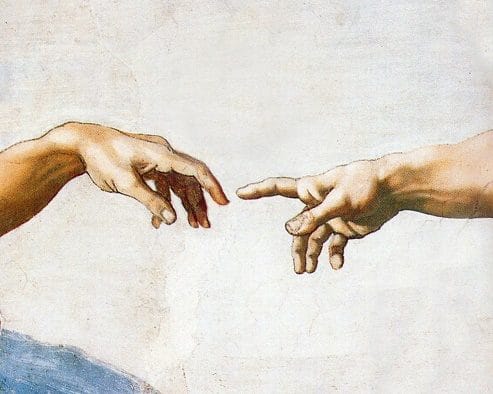
What follows is probably some of the most important information for people who have decided to really change their lives for the better. Not only does this path take us far forward, but it also provides us with long-term stability or a new life.
We will touch on the fundamental beliefs that drive us to think in specific ways and, like an invisible hand in the background, dictate our moves. We will learn how and why our conscious will and this powerful force are in conflict. The schism between them results, among other things, in inner stress. (This is the kind of stress that affects health.)
What really drives us to make specific choices?

We often think that we make rational choices, or that we choose our choices wisely. But this is often not the case.
If we forget for a moment the details and nuances and look into the background of important decisions, we may find that we are still guided by unconscious, but deep-rooted, so-called “tribal beliefs”. These are impulses – we may even experience them as instincts or uncontrollable mental and physical pressures – that compel us to react in specific ways to circumstances.
They are often much stronger than our weak will and we simply cannot resist them. They come from deep-seated, but still alive, struggles for survival in primitive communities and in the wilderness.
Back in the day, when we still lived in the wild and under the tribe, our lives were very different. We lived in groups, because an individual could not survive in the wild.
The tribe provided a safe haven, a regular diet and, above all, a defence against various dangers, both from nature and from other tribes.
The main priority of the individual was to maintain strong and stable ties with the community, as only being in a group allowed him to be safe and to survive.
If a tribe ostracised someone, ostracism meant almost certain death, as the wilderness was full of dangers that were very difficult for the individual to face.
Therefore, the guiding principle for every tribe member was maximum adaptability to the community and its rules. Each one tried to be as useful as possible or to develop a skill that added value to the community (preferably as much as possible).
At the same time, he wanted to climb the hierarchical ladder of the tribe, because by consolidating his position or by having a strong influence in the community, he secured various treats, as well as the respect of others.
Even though millennia have passed, we still behave the same way … except that we often fail to link our own actions to this primal search for security.
Let’s look at some of the more important beliefs.
We are still guided by tribal beliefs …

Most people have a strong fear of rejection. Many times we don’t take on something new because the fear of failure is stronger than the desire to achieve.
The matter becomes logical when considered from the point of view of tribal beliefs. Rejection was directly linked to exclusion: when someone rejected us, they excluded us. Many times this meant that we became adversaries fighting for the same thing, e.g. food or territory.
Of course, if someone rejects us today, or even excludes us from their society, that action will not affect our survival. In fact, people can reject us all day long and we will not be picked up for it.
But we still feel the pain of rejection deep down, as if something bad has happened. (By the way, if we make a deliberate and conscious effort to change this feeling, it can be almost completely eliminated with some training. But as long as we avoid it or push it in, we will feel pain every time we reject it.)
The other side of the same coin is the desire to be accepted. We instinctively associate with people we value and respect, and with more visible members of the community. We want to please them, and sometimes we are willing to go to great lengths to please them (read: go to a job we don’t exactly love).
We believe that if we please someone enough, they will love us enough to take us under their wing or care for us. The more they need us – making us more and more indispensable to them – the better or more secure we will feel.
The next thing is a strong impulse to control the situation. We want to know the rules so that we can adapt to them. When we know “where we stand” – and then follow the written or unwritten guidelines or rules – we feel safe.
The tendency to want to be in control is also manifested through monitoring what is happening around us and detecting potential problems. In the wild, tribe members looked out for each other. Not only to ensure their immediate safety, but also to detect in time any irregularities or disrespect for tribal rules. (By breaking or disrespecting the rules, an individual could endanger the whole tribe; for example, by falling asleep on guard duty.)
Today, we are still doing the same. We look around us and focus more on the failures than on the successes. Our mind is also adapted to this function and until we “take it in hand”, it will tend to look for problems by inertia.
The latter can lead us to a very specific perception of the world. Our lives are very much a tick-box problem. When we observe what is going on in our surroundings and find that everything is going normally or according to our expectations, we are pleased – and we tick the box. (Unfortunately, this only lasts for a short time and we soon go on another round…)
When we find that our expectations are not being met, we perceive the situation as problematic. Unpleasant feelings arise, which we then either express or keep to ourselves.
This kind of evaluation of life is so ingrained in some of our cells that it can become our dominant expression – all we do is check how much things around us are going according to our expectations. And then there’s a tick if we’re happy with what we see, or unpleasant feelings when things are going differently.
Because we do this – mostly unconsciously – practically all the time, there is no room for joy, playfulness, childlike curiosity, creativity … in this kind of situation, because our minds are working on completely “different gears”.
Tribal beliefs in the modern era

The link between adding value to the “tribe” and one’s own feelings of fulfilment is also very interesting. Have you ever found that on a day when you have contributed something really big to the community – for example, at work or in your family – you find it easy to take time out? And even give yourself permission to assert your own desires a little more?
At the same time, there is a strong sense of deserving reward or remuneration. For example, if we do something really important at work, we take it for granted that we are due a reward. But if we have not contributed any more than usual, we do not have this feeling.
What’s more, many of us believe deep down that we have to work hard to afford to get paid (more). Often the matter is so comical that we can literally create a problem which we then solve. And when we solve it, we feel that now we deserve a reward. The more energy we put in, the better we feel about the reward.
Looking at it from the side, we can see that the final picture of the situation is exactly the same as if the problem had never occurred: the situation in the evening is the same as it was in the morning, before the problem manifested itself. So, from the point of view of growth and progress, nothing has been done; we have just created a fire and put it out.
The key difference is in the feelings. If we didn’t “work from morning till night”, we wouldn’t feel we deserved to be paid. And because we need this feeling, we unconsciously create problems day by day so that we can solve them throughout the day. (Of course, we never see that we have created the fire – we only see ourselves as the hero who put it out…)
At a conscious level we may complain about the situation, but deep down we feel somehow relieved and comforted: “To the tribe”. we did our bit and proved how indispensable we are. And because the tribe needs us, we feel safe.
So the pleasant feeling we get in the evening after a busy day and a timely calming of the situation is actually just a feeling of basic security.
Finally, let’s look at the strongest tribal feeling that, in ordinary, everyday circumstances, creates our current happiness or well-being:
I feel good when I have done my daily chores – I have contributed to the “tribe” what was expected of me – and at the same time, when I think about the future, I feel that it is taken care of.
Most of the time, this position is expressed in parallel with the tick-box approach. In this case, the circumstances mentioned represent our highest point of happiness or our strongest inner fulfilment.
How to go beyond tribal restrictions?

The question naturally arises how to extricate ourselves from the clutches of these powerful, mostly unconscious forces. The solution is, in fact, simple: we need to rise above the status of follower in the tribe to the point where we start to set our own rules.
As long as we obey the rules and are careful not to accidentally step on someone’s toes … spreading “positive energy” and seeking approval for our actions from those around us … while at the same time trying to add value (read: create circumstances where we will be useful and society will need us), we have the feeling that circumstances dictate our lives, and we are therefore directly dependent on others.
But the more we try to please and please others, the stronger the feeling that we are losing ourselves because we cannot express ourselves creatively. It is creativity that fills us with joy and energy, gives us the will to live and makes us feel that we have taken life into our own hands.
When we allow ourselves to feel a vision of a new life and set ourselves a clear goal, we come alive again. From this invisible energy of joyful expectation, we begin to draw strength, inspiration, motivation, energy and courage to continue on the path.
When there is an obstacle along the way … when we get sidetracked … get lost in the little things … start to doubt ourselves and so on, this energy will literally carry us over the blockages and put us on the right path.
The charge will be so powerful that tribal beliefs will fade in its light. They will become so small and insignificant that they will lose power and meaning in our minds.
In fact, we will begin to wonder how we could have walked around for so long with our heads bowed while a song was playing inside us all the time … unheard because of our focus on our surroundings and others. Or we heard it, but then immediately suppressed or silenced it – for fear of how the “tribe” would react if we announced that we would follow it.
And we have done it so many times that we have become apathetic to its melody. Repressing the strong desire that burned within us has become part of our character. Over time, we have “discovered” that being trapped in our circumstances is our only option… while watching with awe and awe the brave who have stepped out on their own.
But perhaps the time has come to finally take that step?
Help on the road to success

If you still hear even a hint of a melody – even if it is very distant or drowned out by the loud sounds of the logical mind or fears – don’t despair.
There is still a chance to live life to the full, no matter what your trials have been or how old you are. Unfortunately, for many of us, life has not caught up with us.
But let’s look at the other side: we never receive a test without also receiving a solution. If we bow our heads at the experience, it only means that we have not found the answer we were meant to find. Or we didn’t persevere long enough.
If you need a little encouragement or help to move forward, there is now a new option. At the request of many, we have prepared a recording of the workshop Boris Vene “The Way of the Heart”, where he took the whole group through a personal transformation.
Although it was a combination of personal transformation and business advice, the workshop was almost entirely based on turning inwards, capturing your own power and deciding on a new path.
And the result?
On the third day, a participant, one of the company’s managers – the workshop was organised by a successful Slovenian company – said: ‘When I woke up in the morning, I had a “feeling” that I was alive. I felt ‘alive’. I sang, I squealed… For the first time in my life!” (You can hear her words here.)
If you want to experience similar feelings, we strongly recommend ordering the workshop recordings and listening to them over and over again. (People say they hear something new every time they listen.)
Six (short) sample recordings are also available.
But maybe that’s exactly what you need to get back to life…
Editorial Board
PS: If you are involved in personal growth or have in the past sought answers to resolve and eliminate limiting beliefs, unconscious programmes or behavioural patterns, you have probably already realised that there are many techniques and approaches available.
In fact, all approaches fall into just two broad groups. The first group consists of situation management techniques. This includes at least 99% of the solutions. These are the various aids that offer advice on how to reduce the impact of a situation or eliminate unpleasant thoughts or feelings that arise.
This is not the best way. It is much better to rise above the situation so much that it does not affect us at all.
This advice may seem very obvious and “logical” to you, but many times we do not act on it. What do we do when we become irritated, sad, black-eyed, numb…? Instead of creating a situation within ourselves in which these emotions cannot develop or exist, we learn various techniques to “eliminate negative emotions”.
By dealing with the problem, we remain at the same level at which the issue arose or came to light. We can mitigate the problem for now, but we won’t fix it …
The quickest, simplest and above all long-term solution – to paraphrase Jesus a little – is to throw off the old clothes, rise to a higher level, choose a completely new path and allow “the dead to bury the dead”.
If you need help making the leap, read the description of the workshop “The Way of the Heart” and listen to the recordings on the website.
We wish you well and we believe in you. There is still a chance for you too!
The content of this article has been adapted from Boris Vene and Nikola Grubiša.
